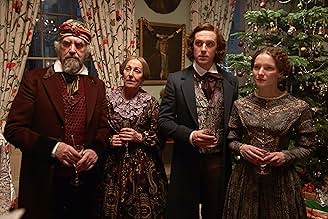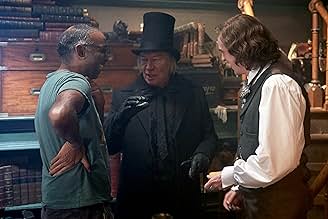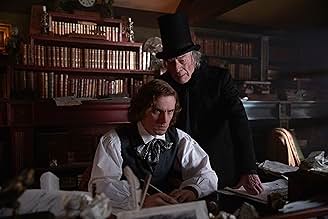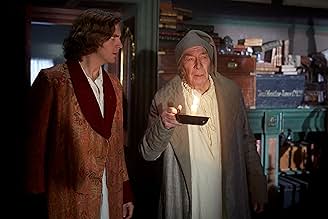PUNTUACIÓN EN IMDb
7,0/10
21 mil
TU PUNTUACIÓN
"El viaje que llevó a Charles Dickens a crear ""Un Cuento de Navidad"", una historia atemporal que redefinió las fiestas.""El viaje que llevó a Charles Dickens a crear ""Un Cuento de Navidad"", una historia atemporal que redefinió las fiestas.""El viaje que llevó a Charles Dickens a crear ""Un Cuento de Navidad"", una historia atemporal que redefinió las fiestas."
- Dirección
- Guión
- Reparto principal
- Premios
- 2 premios y 8 nominaciones en total
Cosimo Fusco
- Signor Mazzini
- (as Cosimo Massimo Fusco)
Jasper Hughes Cotter
- Walter Dickens
- (as Jasper Hughes-Cotter)
Reseñas destacadas
5 December 2017. This whimsical family period drama about Charles Dickens' experience in writing and in getting his Christmas classic, "A Christmas Carol" published offers up a delightful and penetrating movie tapping into the special nature of film. Using creative imagination, artistry, and some fascinating stylized characters, the movie's director and screenplay writer have brought to the screen a wonderful film that both tantalizes with its whimsy and penetrates with its emotional dramatic scenes that even enhance A Christmas Carol story itself. Unlike the trailers for this movie, the movie tends towards more of a dramatic tone with tender sad moments, flaring outbursts of emotional anger, redemption, all the while interspersed with imagining of the creative process of Mr. Dickens. Like A Christmas Carol itself, this movie presents a hidden side of Charles Dickens and nineteenth century Britain in a revealing and meaningful way. This move is a wonderful way to spend some reflective and enjoyable moments at the theater during these Holidays.
For me this is how you do a good biopic. Stay faithful to what happened but at the same time be creative with the way you tell the story. This is a mix of fairy tale and history, which is the exact formula needed to tell the story of the creation of A Christmas Carroll. The book is such an iconic piece of literature that helped reshape the way people in England saw Christmas, and the movie shows very well how that happened. The cast is good, headlined by the excellent Christopher Plummer playing a wonderful Scrooge. Good period recreation and well directed, this movie has little faults. For it to be a crowd-pleaser while also historically accurate is not an easy task and if I can find any flaw is that it plays a little too safe. Nevertheless, well done.
After missing this 2017 film, I agreed with my family: Considering the hot summer months and the rising political and social temperatures as well, an early visit to Christmas and the man who helped remind us what the holiday is all about was a pretty good idea (as in, why can't we think like this all year-round?).
"The Man Who Invented Christmas" revolves around Charles Dickens (played by Dan Stevens of "Downton Abbey" fame) and the personal and creative journey he took in writing his beloved novel, "A Christmas Carol."
Dickens, who wrote the book in 1843, intended it to "strike a sledge hammer blow" for the poor, an idea that sprang from a trek to Manchester, where he observed the plight of manufacturing workers, and from what he had seen at the Field Lane Ragged School.
History tells us that his characters leapt to life in his consciousness and that he became so engrossed he "wept and laughed, and wept again," and that he "walked about the black streets of London fifteen or twenty miles a night when all sober folks had gone to bed."
The film is sumptuous, the production values and photography lush and appealing and, when appropriately necessary, cautionary and convincing.
Stevens is excellent as the driven author, moving from warmth to near creative madness without overdoing either, but Christopher Plummer as the imaginary Scrooge he conjures in his mind nearly steals the show, trading barbs and supplying the logic of someone who has forgotten the meaning of love and life.
It's a special fascination to see how artists think and work, borrowing bits and pieces from the people and happenings around them to knit a separate entity that then stands alone by itself.
I didn't find the film preachy or message-driven, though it's impossible in the current climate not to think that some of what's going on here and across Europe may not have seeped into the production. Art usually reflects the fervor of its time.
Still in all, viewers across the political spectrum will find the film more than enjoyable and a welcome reminder that we should _ and can _ celebrate each other all the time, not just in advance of exchanging Christmas presents and knocking back a cold one.
Adding some spice to the film is some clever humor delivered by actors top to bottom who clearly have the training and experience to bring a funny line into the winner's circle.
It's said that "A Christmas Carol" reawakened the spirit of Christmas in both Britain and America.
I think watching this movie does the same thing for viewers too no matter the time of year, and considering what we're experiencing now, that ain't a bad thing.
"The Man Who Invented Christmas" revolves around Charles Dickens (played by Dan Stevens of "Downton Abbey" fame) and the personal and creative journey he took in writing his beloved novel, "A Christmas Carol."
Dickens, who wrote the book in 1843, intended it to "strike a sledge hammer blow" for the poor, an idea that sprang from a trek to Manchester, where he observed the plight of manufacturing workers, and from what he had seen at the Field Lane Ragged School.
History tells us that his characters leapt to life in his consciousness and that he became so engrossed he "wept and laughed, and wept again," and that he "walked about the black streets of London fifteen or twenty miles a night when all sober folks had gone to bed."
The film is sumptuous, the production values and photography lush and appealing and, when appropriately necessary, cautionary and convincing.
Stevens is excellent as the driven author, moving from warmth to near creative madness without overdoing either, but Christopher Plummer as the imaginary Scrooge he conjures in his mind nearly steals the show, trading barbs and supplying the logic of someone who has forgotten the meaning of love and life.
It's a special fascination to see how artists think and work, borrowing bits and pieces from the people and happenings around them to knit a separate entity that then stands alone by itself.
I didn't find the film preachy or message-driven, though it's impossible in the current climate not to think that some of what's going on here and across Europe may not have seeped into the production. Art usually reflects the fervor of its time.
Still in all, viewers across the political spectrum will find the film more than enjoyable and a welcome reminder that we should _ and can _ celebrate each other all the time, not just in advance of exchanging Christmas presents and knocking back a cold one.
Adding some spice to the film is some clever humor delivered by actors top to bottom who clearly have the training and experience to bring a funny line into the winner's circle.
It's said that "A Christmas Carol" reawakened the spirit of Christmas in both Britain and America.
I think watching this movie does the same thing for viewers too no matter the time of year, and considering what we're experiencing now, that ain't a bad thing.
Greetings again from the darkness. Most would agree there is only one Christmas story that surpasses the popularity and familiarity of Charles Dickens' "A Christmas Carol", and both have had numerous film and screen adaptations. Rather than offer up yet another film version of the Dickens novella, director Bharat Nalluri (MISS PETTIGREW LIVES FOR A DAY, 2008) instead uses the Susan Coyne screenplay adapted from the non-fiction work of Les Standiford to present the lively and entertaining tale of HOW Dickens wrote his iconic book.
Dan Stevens (BEAUTY AND THE BEAST, 2017) stars as the esteemed writer Charles Dickens, and he bounds from scene to scene like a moody and spoiled Energizer Bunny. Attempts to capture the process behind creative writing usually falls into one of two buckets: dry and boring, or outlandish and over-the-top. Mr. Stevens easily fits into the latter, but as a testament to the strength of the story and supporting cast, we viewers are nonetheless quite entertained.
It should surprise no one that Christopher Plummer steals each of his scenes as Ebenezer Scrooge. What a delight to behold the talented octogenarian as he leaves us wishing for even more of the grumpy and miserly old former partner of Jacob Marley. Jonathan Pryce also excels as Charles' father John, a charming man who has never quite figured out the economics of life and whose long ago debt sent young Charles to a work house mixing shoe black. Even as an adult, Charles had recurring nightmares of his time in child labor, and fortunately he was able to use those memories to create many long-lasting stories, each oblivious to generational change.
In 1843 London, the renowned Dickens is coming off three straight flops and experiencing financial woes that are exacerbated by his insistence on the finest materials for the large home he and wife Kate (Morfydd Clark, LOVE & FRIENDSHIP) are renovating. Dickens is in the midst of severe writer's block, and only the quiet strength of his wife and never-wavering loyalty of friend/agent John Forster (Justin Edwards) are able to keep in from sinking to even lower emotional depths. Screen veteran Miriam Margolyes plays the housekeeper, and Anna Murphy is Tara, the Irish nanny who serves as a muse for Dickens.
Having the characters of the story appear on screen and interact with the writer is a terrific way to explain how the creative mind works, although at times, the sources of ideas, characters and key lines seem a bit too convenient. We often get the feeling that perhaps too much was crammed into the run time, what with the conflicts over money, renovations, family matters, and publishing. The best parts are also the easiest with which to relate – those involving the characters and the story slowly coming together.
Simon Callow plays John Leech, the famed illustrator of the finished novella, and Miles Jupp adds a bit of twisted fun as Dickens' rival William Makepeace Thackery. There are some interesting lines that add color, such as, "People will believe anything if you are properly dressed", and "blood of iron, heart of ice". It's these pieces that allow us to view this as a journey of self-discovery for the author, and not just a famous story being assembled. The overall trouble with the film stems from that title. It seems we could have expected more than a tease of what Christmas was at the time, and more specifically how "A Christmas Carol" inspired a revolutionary new approach to the holiday. We are left to connect many dots. In fact, Dickens didn't so much invent Christmas as allow folks to re- imagine it.
Is "A Christmas Carol" the most famous Dickens story? Arguments could also be made for "Oliver Twist", "David Copperfield", "Little Dorrit", "Nicholas Nickelby", and of course, "A Tale of Two Cities". What can't be argued is the brilliance of the writer and the impact of his books. His passion is evident in his determination to self- publish at a time when such practice was a rare as it is commonplace today. The film is rated PG, but younger kids are likely to be confused with the frenetic approach; however, all ages will get a merry kick out of Mr. Plummer's Scrooge!
Dan Stevens (BEAUTY AND THE BEAST, 2017) stars as the esteemed writer Charles Dickens, and he bounds from scene to scene like a moody and spoiled Energizer Bunny. Attempts to capture the process behind creative writing usually falls into one of two buckets: dry and boring, or outlandish and over-the-top. Mr. Stevens easily fits into the latter, but as a testament to the strength of the story and supporting cast, we viewers are nonetheless quite entertained.
It should surprise no one that Christopher Plummer steals each of his scenes as Ebenezer Scrooge. What a delight to behold the talented octogenarian as he leaves us wishing for even more of the grumpy and miserly old former partner of Jacob Marley. Jonathan Pryce also excels as Charles' father John, a charming man who has never quite figured out the economics of life and whose long ago debt sent young Charles to a work house mixing shoe black. Even as an adult, Charles had recurring nightmares of his time in child labor, and fortunately he was able to use those memories to create many long-lasting stories, each oblivious to generational change.
In 1843 London, the renowned Dickens is coming off three straight flops and experiencing financial woes that are exacerbated by his insistence on the finest materials for the large home he and wife Kate (Morfydd Clark, LOVE & FRIENDSHIP) are renovating. Dickens is in the midst of severe writer's block, and only the quiet strength of his wife and never-wavering loyalty of friend/agent John Forster (Justin Edwards) are able to keep in from sinking to even lower emotional depths. Screen veteran Miriam Margolyes plays the housekeeper, and Anna Murphy is Tara, the Irish nanny who serves as a muse for Dickens.
Having the characters of the story appear on screen and interact with the writer is a terrific way to explain how the creative mind works, although at times, the sources of ideas, characters and key lines seem a bit too convenient. We often get the feeling that perhaps too much was crammed into the run time, what with the conflicts over money, renovations, family matters, and publishing. The best parts are also the easiest with which to relate – those involving the characters and the story slowly coming together.
Simon Callow plays John Leech, the famed illustrator of the finished novella, and Miles Jupp adds a bit of twisted fun as Dickens' rival William Makepeace Thackery. There are some interesting lines that add color, such as, "People will believe anything if you are properly dressed", and "blood of iron, heart of ice". It's these pieces that allow us to view this as a journey of self-discovery for the author, and not just a famous story being assembled. The overall trouble with the film stems from that title. It seems we could have expected more than a tease of what Christmas was at the time, and more specifically how "A Christmas Carol" inspired a revolutionary new approach to the holiday. We are left to connect many dots. In fact, Dickens didn't so much invent Christmas as allow folks to re- imagine it.
Is "A Christmas Carol" the most famous Dickens story? Arguments could also be made for "Oliver Twist", "David Copperfield", "Little Dorrit", "Nicholas Nickelby", and of course, "A Tale of Two Cities". What can't be argued is the brilliance of the writer and the impact of his books. His passion is evident in his determination to self- publish at a time when such practice was a rare as it is commonplace today. The film is rated PG, but younger kids are likely to be confused with the frenetic approach; however, all ages will get a merry kick out of Mr. Plummer's Scrooge!
This was my favorite Christmas movie of 2018. That said, you can watch this movie any time of year because it's not really solely a Christmas movie. It's about Charles Dickens trying to write and get "A Christmas Carol" published. So most of the story actually takes place in the fall as he struggles with writers block. It's more an inspiring story about a creative person struggling to accomplish something worthwhile, and because of the elements of the story he's writing, it has Christmas elements now. Save it for Christmas 2019, or watch it now. But just watch it!!!
¿Sabías que...?
- CuriosidadesCharles Dickens' family did, indeed, keep a pet raven, which died unexpectedly while the family was away. Dickens told this story to another author - Edgar Allan Poe - who was then inspired to write a poem about a raven.
- PifiasDespite their portrayal, Dickens and Thackeray were on very friendly terms in 1843. Their feud only started towards the end of the 1850s when Dickens became jealous of Thackeray being compared to him. Thackeray responded by publicly criticizing Dickens' decision to abandon his wife. In addition, Thackeray boasts about the money his latest book has earned. In reality, Thackeray was a struggling hack writer in 1843. He didn't achieve a major success until the publication of Vanity Fair in 1847. Dickens and Thackeray were reconciled shortly before the latter's death in 1863.
- Citas
Charles Dickens: No one is useless in this world who lightens the burden of another.
- ConexionesFeatured in Box Office: Episodio fechado 30 noviembre 2017 (2017)
- Banda sonoraYankee Doodle Dandy
Performed by The Band of the Royal British Legion
Selecciones populares
Inicia sesión para calificar y añadir a tu lista para recibir recomendaciones personalizadas
- How long is The Man Who Invented Christmas?Con tecnología de Alexa
Detalles
- Fecha de lanzamiento
- Países de origen
- Sitios oficiales
- Idiomas
- Títulos en diferentes países
- L'home que va inventar el Nadal
- Localizaciones del rodaje
- Empresas productoras
- Ver más compañías en los créditos en IMDbPro
Taquilla
- Recaudación en Estados Unidos y Canadá
- 5.676.486 US$
- Fin de semana de estreno en EE. UU. y Canadá
- 1.357.129 US$
- 26 nov 2017
- Recaudación en todo el mundo
- 8.127.070 US$
- Duración1 hora 44 minutos
- Color
- Relación de aspecto
- 2.35 : 1
Contribuir a esta página
Sugerir un cambio o añadir el contenido que falta




































